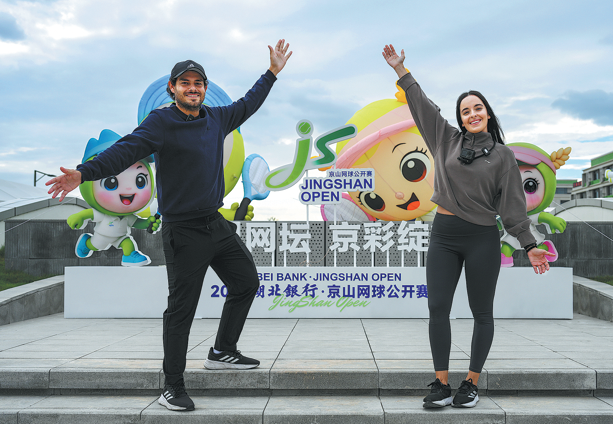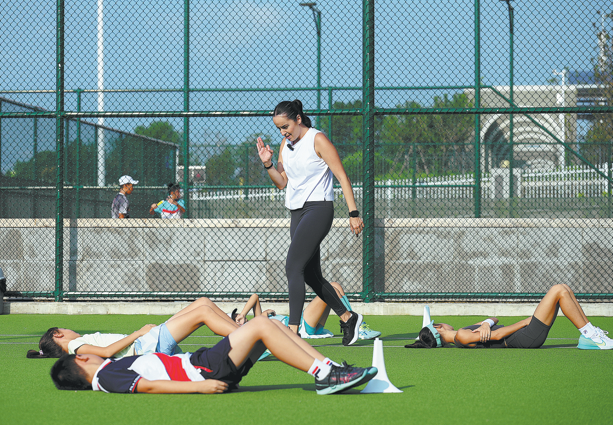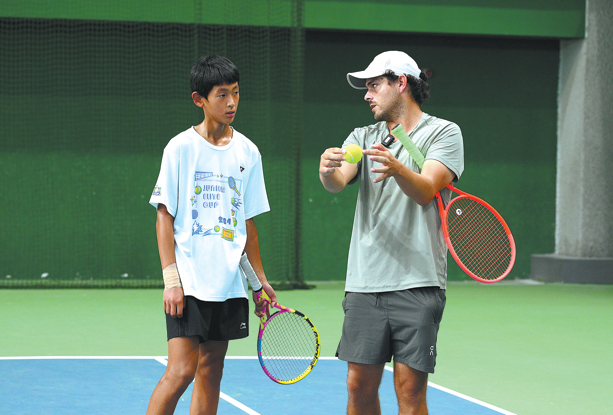
On the training courts of Hubei Tennis School, Fabricio Gonzalez, a veteran coach from Mexico, demonstrates movements to the teenagers and helps adjust their actions, introducing them to advanced tennis strategies.
The school is located in Jingshan, a county-level city in Central China's Hubei province. Acclaimed as the "Tennis City of China", Jingshan has hosted international tournaments such as the WTA 125 and ATP 100, attracting global talent.
In August, the city welcomed Fabricio and his wife Grecia, a respiratory therapist who teaches the trainees breathing techniques.
Fabricio honed his coaching skills in Mexico, the United States and Spain, while Grecia has supported professional tennis players for years with physical preparation and breathing methods. Together, they spent a year and a half in Shanghai before accepting an invitation to join Jingshan's tennis program, working with both the school and a local tennis club.
At first, the city was unfamiliar and seemed daunting for the couple. "It was a tough decision to move to Jingshan," Grecia said. "In the beginning, we were worried because we didn't know the city well."
However, after visiting Jingshan and discovering its vibrant tennis culture, the couple's perspectives changed. The city's tennis facilities and atmosphere captivated them. Walking through the central park surrounded by various types of courts and tennis-themed streetscapes, they realized the sport was integral to the city's identity.
The city has built more than 300 high-standard tennis courts, including clay, grass and hard courts. Of the city's 600,000 population, over 100,000 are tennis enthusiasts, with nearly 60 percent being teenagers, according to the Hubei Administration of Sport.
"These facilities and technologies are amazing, and the players train with passion, even in bad weather," Fabricio said. "It's one of the best options for coaches or players."

The couple has received a support package from the city government, including accommodation, training venues, and cultural exchanges, according to vice-mayor Li Wei, who also leads the city's tennis industry development group.
"Bringing in international coaches offers our players and local trainers access to advanced training ideas and global perspectives, helping us connect with world-class levels," said Gao Bao, executive principal of Hubei Tennis School.
Fabricio brings his technical training methodologies to Jingshan, offering tailored coaching and emphasizing passion and a positive attitude to foster improvement.
Chen Gaoen, 12, who has played tennis for six years, appreciates Fabricio's intensive and well-structured sessions. "I feel more focused and motivated than before," he said. "The coach gives very specific guidance on my footwork and swing techniques."
Gao Min, Chen's mother, highly values the coach's feedback as it helps reduce the reinforcement of mistakes. Chen's high center of gravity while squatting, a problem stemming from his weak leg strength, has also improved under the targeted guidance.
Grecia introduced a rare breathing training course in the domestic youth training scene. The program, which integrates exercise physiology, helps the players overcome their physical limitations.
She prepares young players, most aged 8 to 12, for daily training by leading breathing warm-ups that teach them how to breathe correctly and enhance their performance. Every week, she conducts breathing tests to monitor their progress.

Her students notice the benefits. Zhang Xiran, 10, said the respiratory training enables her to regulate her breathing, improving her power and shot speed.
The process has not been without challenges. For the couple, language is the biggest barrier, which they overcome using phone translators and gestures.
"I was a little frustrated in my first two classes when the students didn't understand me," said Grecia. "But I soon felt better. One boy always helped me translate, and I started to learn Chinese by myself." With simple gestures, phone translators, and the children's willingness, the lessons quickly became smoother.
Both coaches see great potential in their trainees. "Six or seven players could compete in professional and international games as they're equipped with technique, competition, and experience," Fabricio said. The players perform well for their age, even under intense daily training and adverse weather conditions.
The couple hopes to take local players abroad to compete, and to raise a new generation of athletes who can play on the global stage.
"Some of these kids have what it takes to reach the ATP or WTA tours. Our job is to guide them there," Fabricio said.
Contact the writers at guoyanqi@chinadaily.com.cn


